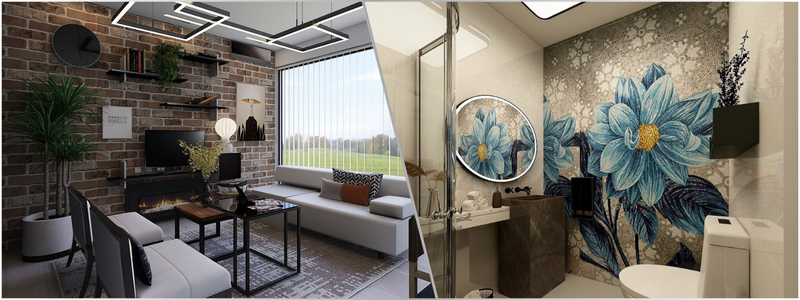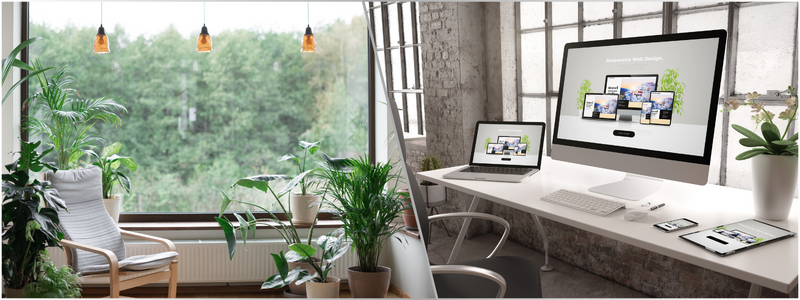Urban wellness is today’s newest up-and-coming trend. As far as the modern era of urban development is concerned, the seamless blend of nature and technology is starting to become the fundamental strategy for creating aesthetically pleasing, healthy, and sustainable urban spaces. The progressive urban planning approach known as biophilic urbanism promotes incorporating natural elements into built settings. Taking advantage of 3D rendering services and 3D designers in this particular approach is changing how companies visualize and construct urban landscapes. Thanks to these services, the fusion of nature and technology is not only possible but also becomes visually compelling and tangible at the same time.
 Table of contents
Table of contents
- The birth of biophilic urbanism
- Biophilic design at a glance
- Benefits of biophilic design
- Breathe life to biophilic design visions with 3D rendering services
- An innovative modern catalyst
- Address social and environmental challenges
- Design and planning made better
- Facilitate better engagement among stakeholders
- Rise above difficulties in urban design
- Promote sustainable development of urban spaces
- Visualize the future of green urban spaces
- Gearing up for the future
- How Cad Crowd can help
The birth of biophilic urbanism
The principle of biophilia is the basis of biophilic urbanism. Biologist Edward O. Wilson popularized the term biophilia, which pertains to humans’ natural tendency to look for connections with nature. The urban design approach integrates natural elements such as natural light, water bodies, plants, and other living systems into urban spaces. The main objective is to create functionally efficient environments while promoting the residents’ health and well-being through nurturing deeper connections with nature.
RELATED: 3 advantages of using 3D rendering services for city planning and development
Biophilic design at a glance
As a contemporary design philosophy, the main concept behind biophilic design is that humankind has an intimate connection to nature. 3D architectural rendering firms often integrates natural elements into interior design and architecture that positively affect people’s mental and physical well-being. Natural light, water features, plants, and natural materials like stone and wood are among the elements that are often used in biophilic design.
The ultimate aim of biophilic design is to create functional spaces that evoke a sense of tranquillity and peace by using natural elements. The most commonly used materials in biophilic design are plants, light, water, wood, concrete, and stone. But there is more to biophilic design than just using these natural materials or adding a few plants here and there. Instead, it is more of a holistic design approach that considers how the built environment can promote sustainability and support the well-being of humans.
Biophilic design has been gaining fame for the past several years, with more and more people recognizing the perks of forming a connection with nature not only for personal health but also for the health of a planet as a whole. The following are some of the fundamental principles of modern biophilic design:
Biomimicry
Biomimicry involves taking inspiration from the processes and systems of nature to inform architectural design, including emulating ecosystem efficiency and using natural ventilation methods.
Natural patterns and forms
This involves the 3D rendering artist integrating organic textures, patterns, and shapes found in nature into décor, furnishings, and architectural elements.
Natural views and light
It maximizes daylight access and provides views of natural elements like water bodies, landscapes, and trees.

Nature in the space
This is about the introduction of indoor gardens, green walls, or living plants in the hopes of bringing nature indoors.
Sensory experience
This engages different senses using natural materials, sounds of nature, scents, and feelings of gentle breeze.
RELATED: How 3D modeling, rendering, and CAD design helps architects create sustainable construction
Benefits of biophilic design
The integration of elements of biophilic design into spaces offers a lot of exciting benefits. For instance, research has revealed that exposure to natural light helps regulate circadian rhythms and improves people’s sleep quality. It has also been shown that being surrounded by plants can help lower anxiety and stress levels, improve mood, and boost productivity. Using natural materials in design and 3D construction rendering services is also more eco-friendly and sustainable as it helps lower the buildings’ environmental impact.
Aside from these environmental and health benefits, biophilic design creates a more engaging and enjoyable experience for everyone within the space. Biophilic design creates a more relaxing and calming ambiance by incorporating natural elements into built environments. It also fosters a sense of engagement and connection with the nearby environment.
Breathe life to biophilic design visions with 3D rendering services
As one of today’s most powerful tools 3D architectural visualization firms utilize, 3D rendering services have become invaluable in modern urban planning. Thanks to this, planners and architects alike can develop realistic and detailed animations and images of proposed urban projects.
Regarding biophilic urbanism, today’s 3D rendering services are an integral partner as they help breathe life into the designs and concepts of urban spaces infused with the beauty and serenity of nature. These services also offer a glimpse of cities in the future, showcasing their transformation when natural elements are added.
An innovative modern catalyst
Taking advantage of 3D rendering services for designing biophilic urban spaces catalyzes innovative urban design. This opens new possibilities for unconventional and creative solutions in incorporating nature into urban spaces. 3D rendering services help push the boundaries of conventional urban design, from nature-infused public plazas to green bridges and verdant rooftop gardens.
RELATED: 6 sustainable design solutions your architectural design services should use
Address social and environmental challenges
When visualized with the help of 3D architectural modeling professionals, biophilic urbanism can help address numerous social and environmental concerns that many modern cities often deal with. When urban designs are infused with natural elements, these contemporary projects can significantly reduce the effects of urban heat islands while enhancing air quality and promoting biodiversity. Aside from these, they also provide social benefits by creating healthy and serene areas for residents that can help their health and well-being in general.
Design and planning made better
3D rendering services can also help your company as they improve urban planning and design phases. These unique services enable a more detailed and comprehensive exploration and discovery of the best way to incorporate natural elements into different urban settings. These 3D visualization services also give way to experimenting with various layouts, evaluating the effect of natural light, and investigating how to integrate green spaces into dense urban areas. Such an impressive level of detail guarantees that adding natural elements will not only be pleasing to the eyes it is viable in terms of function at the same time.

RELATED: 3D landscape design services: cost, rates, and pricing for companies and firms
Facilitate better engagement among stakeholders
Effective communication is and will always be the key when it comes to any size and shape of urban development project. Biophilic designs developed by 3D rendering services allow better engagement and more transparent communication with all the stakeholders involved, including investors, city officials, and the community. The 3D renderings can help solidify support and consensus for modern biophilic initiatives by offering a more realistic glimpse of the proposed project.
Rise above difficulties in urban design
Urban design is often embroiled with navigating different challenges and difficulties. These may include limitations in budget, regulatory requirements, and spatial constraints. 3D rendering services can help rise above these challenges. These services allow 3D architectural designers to explore numerous elements of biophilic design and their specific configurations in complicated concept of urban spaces. They also help pinpoint potential problems early on in the design process, which thereby helps save resources and time down the road.
Promote sustainable development of urban spaces
Working with 3D rendering service providers specializing in biophilic urbanism is an integral step to achieving sustainable development of urban spaces. This can aid in the design of urban areas that are beneficial to the environment and have the level of resilience required to withstand the threats of climate change. With the ability to visualize the effective and efficient use of green spaces, energy-efficient designs, and water management systems, 3D rendering services can help create more sustainable models for urban developments in the near future.
Visualize the future of green urban spaces
Through the help of 3D architectural animation companies, architects and urban planners can better envision the best ways to incorporate green spaces in the urban fabric in a more comprehensive and detailed manner. It includes the design of green corridors, urban parks, vertical gardens, and green roofs. This kind of 3D visualization inspires and helps convince both the public and the stakeholders better regarding the perks and feasibility of infusing nature into modern urban settings.
RELATED: Utilizing 3D rendering services for companies in architectural property development
Gearing up for the future
With the continuous and seemingly unstoppable growth of populations in urban areas, the need for liable, healthy, and sustainable cities becomes increasingly pressing. 3D rendering services for designing urban wellness and biophilic urbanism are promising approaches to developing functional urban environments that advocate for people to form a deeper connection with nature. Through the use of 3D rendering services to visualize biophilic designs, it is now possible to create and develop a better future not only for humankind but also for the beloved planet.
How Cad Crowd can help
Cad Crowd is your leading resource for the best and most trusted 3D rendering professionals who can turn your envisioned biophilic oasis into reality. Contact us today and let us know how we can help you with your next project!
